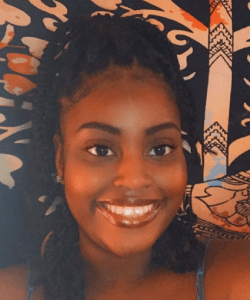First Person
Student Notebook: Police Brutality and Mental Health in the African-American Community

Rodney King was severely beaten by Los Angeles police officers just 29 years ago. In 2014, Eric Garner was murdered by police in New York City after being placed in a choke hold. Sandra Bland died shortly after a traffic stop in Texas in 2015. She was found hanging in a police cell while in detention. Months earlier, Freddie Gray died after being brutally beaten and thrown without medical assistance in the back of a Baltimore police van. The next year in Minnesota, Philando Castile was pulled over for having a broken taillight. He died after being shot several times. We now have Breonna Taylor in 2020, an EMT in Louisville, Kentucky, who had been working to help people impacted by COVID-19. She was shot to death in her own home by police executing a no-knock search warrant. Should we have to fear danger when we are in our own homes? And then of course came George Floyd, whose death triggered outrage across the nation. In times like these, as an African-American woman, I want to get angry. I want to act belligerently. Events of the last months will impact me for the rest of my life as I walk the earth and move into my career as a Black woman.
Repeated acts of police violence against Black people have caused mass demonstrations and public concern, and frequent depictions of these incidences have had a significant effect on the psychological well-being of Black families and communities, who are much more likely to experience police brutality than Whites. In 2018, researchers at the School of Public Health at Boston University and the University of Pennsylvania published a study demonstrating that increased incidences of violence in which unarmed African Americans were killed by police were associated with increased depression, tension, and other mental health issues among Blacks (Bor et al., 2018). In other words, as Lisa H. Thurau and Johanna Wald (2018) wrote in USA Today, systemic “police brutality is damaging the mental health of African Americans—even those who have no direct connection to the men, women, and teens who have lost their lives.” Using mental health assessment data and a police-shooting database, the researchers also found that when U.S. police officers killed unarmed Black people, it had a heightened impact on the mental health of Black Americans living in the same state, reported John Eligon (2018) in the New York Times. White Americans’ mental health was not found to be similarly affected, nor did they report experiencing a similar response to the deaths of unarmed White Americans at the hands of police officers.
Mental health research has shown a causal correlation between perceived racial discrimination and other negative effects on mental health as well. Depression, anxiety, and increased use of drugs, feelings of hopelessness, and suicidal ideation in Black youth and adults have been correlated with perceived prejudice, racism, and both implicit and explicit forms of discrimination (Bor et al., 2018). African American males racially profiled as offenders are also at increased risk of subsequent depressive symptoms and post-traumatic stress disorder.
Developing symptoms associated with mental health issues may in turn perpetuate a cycle of violence. Studies show that people with mental illnesses, especially those who are Black, are disproportionately at risk of being killed by police compared with the general population (Thurau & Wald, 2018). Psychological scientists, as leaders in mental health care, “can play a vital role in promoting a positive relationship between law enforcement agencies and the Black community while providing high-quality treatment to those affected by police brutality” (American Psychiatric Association, 2018). George Floyd’s death triggered a national uproar because African Americans are tired of the senseless death and racist injustice. We will get heard. If we cannot get equity, it is only fair to give us equality.
“While these findings might seem unsurprising, particularly to African Americans,” Eligon noted in his article, “the researchers contended that their study was a significant attempt to assess the measurable, if indirect, harms that police violence has inflicted on the broader psychological and emotional well-being of African Americans.”
References
American Psychiatric Association. (2018). Position statement on police brutality and black males. https://www.psychiatry.org/File%20Library/About-APA/Organization-Documents-Policies/Policies/Position-Police-Brutality-and-Black-Males.pdf
Bor, J., Venkataramani, A. S., Williams, D. R., & Tsai, A. C. (2018). Police killings and their spillover effects on the mental health of black Americans: A population-based, quasi-experimental study. The Lancet, 392(10144), 302–310. https://doi:10.1016/s0140-6736(18)31130-9
Eligon, J. (2018, June 21). Police killings have harmed mental health in black communities, study finds. The New York Times. https://www.nytimes.com/2018/06/21/us/police-shootings-black-mental-health.html
Thurau, L. H., & Wald, J. (2018, September 14). Police killings, brutality damaging mental health of black community. USA Today. https://www.usatoday.com/story/opinion/policing/spotlight/2018/09/14/police-brutality-damaging-black-communitys-mental-health/1218566002/
Student Notebook serves as a forum in which APS Student Caucus members communicate their ideas, suggestions, and experiences. Read other Student Notebook columns here, and learn about the benefits of Student Membership.
Interested in submitting a Student Notebook article of your own? Learn more and indicate your interest by clicking here (logged-in APS members only).





Comments
This article qualities for a Pulitzer prize consideration!
Very well written . And extremely proud of you.
Surburly written Erin Steatean. Definitely worth a Pulitzer Prize and Nation Wide recognition. VERY PROUD of YOU!!! ❤
Very well written with straight facts. Super proud of you! ❤️❤️
Very informative this was a great read.
APS regularly opens certain online articles for discussion on our website. Effective February 2021, you must be a logged-in APS member to post comments. By posting a comment, you agree to our Community Guidelines and the display of your profile information, including your name and affiliation. Any opinions, findings, conclusions, or recommendations present in article comments are those of the writers and do not necessarily reflect the views of APS or the article’s author. For more information, please see our Community Guidelines.
Please login with your APS account to comment.